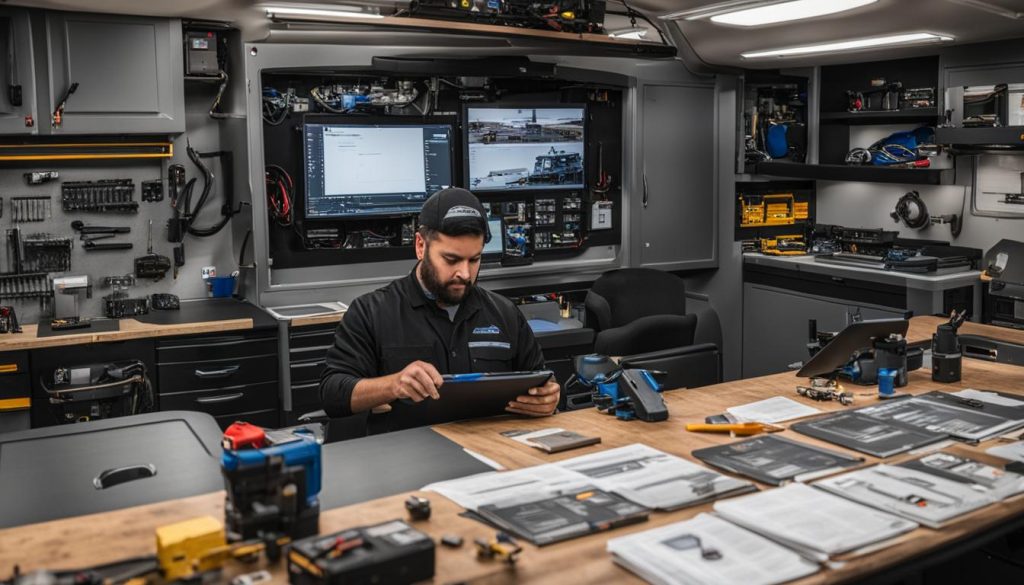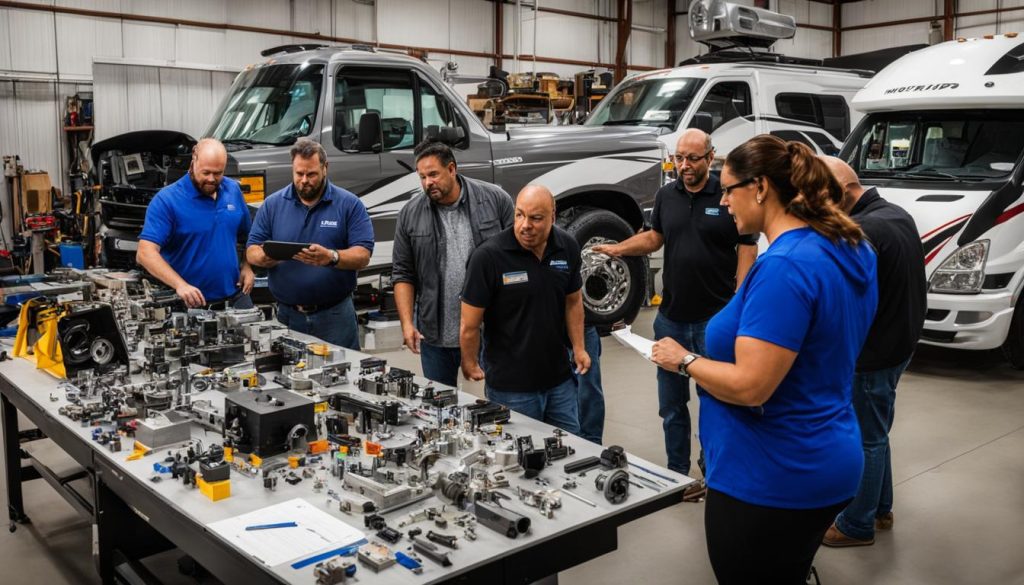Becoming a Certified RV Technician: Tips & Steps
gorvlifestyle.com and its partners may earn a commission if you purchase a product through one of our links
If you’re interested in becoming a certified RV technician, there are several steps you can take to kickstart your career in RV maintenance. In this article, we’ll provide you with expert tips and guidance on how to become a certified RV technician in the United States. Whether you’re a hands-on person with a passion for fixing things or looking for a career change, becoming a certified RV technician can offer you exciting job opportunities in the RV industry. We’ll cover the necessary training, certification requirements, and career pathways in this comprehensive guide.
Key Takeaways
- Research and choose a reputable RV technician training program accredited by industry organizations like the RV Industry Association (RVIA) and the National RV Dealer’s Association (RVDA).
- Enroll in the training program and complete the required coursework and hands-on training.
- Gain practical experience by working on RVs under the supervision of experienced technicians or through an apprenticeship.
- Take the necessary certification exams, such as the RV Technical Institute’s certification exams, to become a certified RV technician.
- Consider further specialization and certification in specific areas of RV maintenance and repair.
What Does a Certified RV Service Technician Do?
A certified RV service technician is responsible for inspecting, diagnosing, repairing, and maintaining various systems and components in RVs. Their job involves working on appliances, automotive systems, carpentry, plumbing, electrical systems, generators, glasswork, HVAC, paint/decal, metalworking, and solar system infrastructure in RVs of all types.
Whether it’s fixing a plumbing issue, repairing electrical systems, or replacing exterior components, RV service technicians need to have a wide range of skills and knowledge across multiple fields. They work on RVs of different categories, from small teardrops to luxury Class A motorhomes. The demand for certified RV technicians is high due to the increasing number of RVs on the road and the need for maintenance and repairs.
RV Technician Job Description
A certified RV service technician’s job description includes:
- Performing inspections of RVs to identify issues and determine necessary repairs.
- Diagnosing problems using diagnostic tools and equipment.
- Repairing and replacing faulty components and systems.
- Performing routine maintenance tasks to ensure the proper functioning of RV systems.
- Testing repaired systems to ensure they are functioning correctly.
- Providing customers with advice and recommendations on maintenance and repairs.
- Adhering to safety guidelines and industry standards.
“Being a certified RV technician requires a combination of technical skills, problem-solving abilities, and a passion for RV maintenance. It’s a rewarding career that allows you to work with different types of RVs and help people enjoy their RVing experiences to the fullest.”
| Skills | Responsibilities | Qualifications |
|---|---|---|
|
|
|
Steps to Becoming a Certified RV Technician
To become a certified RV technician, there are specific steps you need to follow. Here are the key steps to help you on your journey:
- Research and choose a reputable RV technician training program: Start by researching and selecting an RV technician training program that is accredited by industry organizations like the RV Industry Association (RVIA) and the National RV Dealer’s Association (RVDA). These accreditations ensure that the program meets the industry standards and provides quality education and training.
- Enroll in the training program and complete the required coursework and hands-on training: Once you have chosen a suitable program, enroll in it and complete all the required coursework and hands-on training. This will provide you with the necessary knowledge and skills to work as an RV technician.
- Gain practical experience: To further enhance your skills, it is crucial to gain practical experience. This can be achieved by working on RVs under the supervision of experienced technicians or through an apprenticeship program. Practical experience will help you apply the theoretical knowledge you’ve learned and improve your problem-solving abilities.
- Take the necessary certification exams: To become a certified RV technician, you must pass the required certification exams. The RV Technical Institute offers certification exams that assess your knowledge and competence in RV maintenance and repair. Successfully passing these exams will validate your skills and increase your employability.
- Consider further specialization and certification: Once you have obtained your initial certification, you may choose to specialize in specific areas of RV maintenance and repair. This could include electrical systems, chassis, electronics, appliances, or slideouts. Obtaining additional certifications in these specialized areas will enhance your expertise and open up more career opportunities.
- Stay updated with the latest industry trends and regulations: The RV industry is continually evolving, with new technologies and regulations emerging. It is essential to stay updated with these changes by participating in continuing education and professional development opportunities. This will ensure that you remain knowledgeable and competitive in the field of RV maintenance and repair.
By following these steps, you can become a qualified and certified RV technician ready to embark on a rewarding career in the RV industry.
RV Technician Certification Requirements
To obtain certification as an RV technician, you need to fulfill specific requirements set by the certification program and organization. These requirements ensure that you have the necessary knowledge and skills to excel in your role as an RV technician. By meeting these requirements, you can become a certified RV technician and enhance your credibility in the industry.
- Completion of a recognized RV technician training program: Enrolling in an accredited RV technician training program is the first step towards certification. Choose a program that covers essential topics such as electrical systems, plumbing, appliances, HVAC, and chassis. This comprehensive training will provide you with the foundational knowledge required for a successful career as an RV technician.
- Successfully passing certification exams: To demonstrate your proficiency in RV maintenance and repair, you must pass both written and practical certification exams. These exams assess your knowledge and skills in various areas such as diagnosing and troubleshooting RV systems, performing repairs, and following safety protocols.
- Fulfilling experience or apprenticeship requirements: Some certification programs may require you to gain practical experience or complete an apprenticeship before becoming certified. This hands-on experience allows you to apply your knowledge in real-life scenarios, further strengthening your skills as an RV technician.
- Continuing education and professional development: As an RV technician, it is crucial to stay updated with the latest industry trends and technologies. You will need to engage in continuing education courses and professional development opportunities to maintain and renew your certification. These activities keep you informed about advancements in RV systems and equip you with the skills and knowledge needed to provide top-notch service to RV owners.
- Adhering to the code of ethics and professional standards: Every certification organization expects RV technicians to uphold a code of ethics and maintain professional standards. This includes conducting yourself in an ethical manner, respecting customer confidentiality, and providing honest and reliable service to RV owners.
By fulfilling these certification requirements, you will be well-prepared to embark on a successful career as a certified RV technician. Your certification will not only validate your expertise but also open doors to exciting job opportunities in the thriving RV industry.

RV Technician Training and Courses
RV technician training is a crucial step in becoming a certified RV technician. To acquire the necessary knowledge and hands-on experience, various training programs and courses are available. It is essential to look for programs accredited by industry organizations such as the RV Industry Association (RVIA) and the National RV Dealer’s Association (RVDA).
These training programs cover a wide range of topics that are relevant to RV maintenance and repair. Some of the areas covered include electrical systems, plumbing, appliances, HVAC, and chassis. The curriculum is designed to provide comprehensive training in order to develop the necessary skills to work on RVs of all types, ensuring that you are well-equipped and prepared for the challenges in the field.
Hands-on training is an integral part of the learning process to gain practical experience in RV maintenance and repair. These programs often provide opportunities for students to work on real RVs under the supervision of experienced technicians or through apprenticeships, allowing you to apply what you’ve learned in a practical setting.
Upon completion of certain training programs, certification exams may be offered to validate your proficiency as an RV technician. It is important to note that some programs may require additional exams to obtain certification, depending on the specific program and organization.
When selecting a training program, it is crucial to consider your goals and the certification requirements you aim to meet. Evaluate the program’s curriculum, hands-on training opportunities, and the eligibility criteria for certification. By choosing a program that aligns with your objectives and meets the necessary certification requirements, you can embark on your journey towards becoming a certified RV technician.

Key Benefits of RV Technician Training and Courses:
- Comprehensive curriculum covering various aspects of RV maintenance and repair.
- Hands-on training to gain practical experience working on RVs.
- Opportunity to obtain certification to enhance credibility in the industry.
- Stay updated with the latest industry trends and technologies.
- Potential for career advancement and increased job opportunities in the RV industry.
RV Technician Training Programs Comparison
| Training Program | Accreditation | Curriculum Coverage | Hands-on Training | Certification Exam |
|---|---|---|---|---|
| RV Tech Institute | Accredited by RVIA and RVDA | Comprehensive coverage of RV systems and components | Extensive hands-on training opportunities | Certification exams offered upon completion |
| RV Maintenance Technician Program | Accredited by RVIA and RVDA | Thorough training in RV systems and troubleshooting | Hands-on experience through practical projects | Additional certification required |
| RV Repair Technician Program | Accredited by RVIA and RVDA | In-depth training in RV repair and diagnostics | Hands-on training on a variety of RV models | Certification exams offered upon completion |
Career Opportunities for Certified RV Technicians
Certified RV technicians have a wide range of career opportunities in the RV industry. With the increasing number of RVs on the road, the demand for skilled technicians is on the rise. Here are a few potential career paths for certified RV technicians:
- Working at RV Dealerships or Service Centers: As an RV service technician, you can work at RV dealerships or service centers, where you’ll perform maintenance, repairs, and inspections on customer RVs. This role allows you to work with a variety of RV models and ensure that they are in top-notch condition for their owners.
- Starting Your Own Mobile RV Repair Business: If you prefer a more independent career path, you can start your own mobile RV repair business. By offering on-site maintenance and repair services, you can provide convenience to RV owners who need assistance while on their travels.
- Specializing in Restoring Classic or Vintage RVs: If you have a passion for preserving RV history, you can specialize in restoring classic or vintage RVs. You can work with companies that focus on renovating and preserving RVs from the past, bringing them back to their former glory.
- Working in RV Manufacturing Plants: Another career opportunity for certified RV technicians is to work in RV manufacturing plants or as part of production teams. In this role, you’ll contribute to building and assembling new RVs, ensuring that they meet quality standards and specifications.
- Working as an RV Inspector: As an RV inspector, you can conduct objective inspections for RV buyers, sellers, or appraisals. Your role will be to assess the condition of RVs and provide detailed reports on their mechanical systems, structural integrity, and overall functionality.
- Pursuing Further Specialization: Once you’ve gained experience as a certified RV technician, you can pursue further specialization in specific areas of expertise. This can include electrical systems, chassis, appliances, or other components of RVs. By becoming a master RV technician, you’ll have increased opportunities for career growth and advancement.
The RV industry offers exciting career prospects for certified RV technicians. Whether you choose to work at a service center, start your own business, or specialize in a specific area, there is no shortage of opportunities in this thriving industry.
Salary and Benefits for Certified RV Technicians
Certified RV technicians can enjoy a competitive salary and a range of benefits in their career. The salary of an RV technician can vary depending on factors such as experience, specialization, location, and employer. On average, RV technicians can earn between $40,000 to $90,000 per year, providing a rewarding income for their expertise in the field.
In addition to a competitive salary, many RV dealerships and big chain service centers offer comprehensive benefits packages to their technicians. These packages often include medical, dental, and vision insurance to help you take care of your health. You can also enjoy paid vacations, giving you the opportunity to relax and recharge. Furthermore, employers may provide a 401k retirement plan with company matching, allowing you to build a secure financial future.
Continuing education and certification are vital in the RV industry, and some employers recognize this by providing incentives to their technicians. They may cover the costs of training and certification exams, ensuring you can stay up to date with the latest industry trends and developments. With the opportunity for continual learning and growth, you can expand your skills and increase your value as an RV technician.
Working as an RV technician offers not only a competitive salary and benefits but also the chance to be part of a dynamic industry. You’ll have the opportunity to work on a variety of RVs, from small teardrops to luxurious Class A motorhomes, and contribute to the enjoyment and safety of RV enthusiasts. So, if you have a passion for fixing things and a desire to work in a rewarding field, becoming a certified RV technician can lead to a fulfilling career with attractive compensation.
FAQ
How do I become a certified RV technician?
To become a certified RV technician, you need to research and choose a reputable RV technician training program, enroll in the program, complete the required coursework and hands-on training, gain practical experience, take certification exams, and consider further specialization.
What does a certified RV service technician do?
A certified RV service technician is responsible for inspecting, diagnosing, repairing, and maintaining various systems and components in RVs, including appliances, automotive systems, carpentry, plumbing, electrical systems, generators, glasswork, HVAC, paint/decal, metalworking, and solar system infrastructure.
What are the steps to becoming a certified RV technician?
The steps to becoming a certified RV technician include researching and choosing an accredited RV technician training program, enrolling in the program, completing the required coursework and hands-on training, gaining practical experience, taking certification exams, and considering further specialization.
What are the certification requirements for becoming an RV technician?
The certification requirements for becoming an RV technician generally include completing a recognized RV technician training program, successfully passing certification exams (both written and practical), fulfilling specific experience or apprenticeship requirements, continuing education, and adhering to the code of ethics set by the certification organization.
What training and courses are available for RV technicians?
There are various training programs and courses available for RV technicians. Look for programs that are accredited by industry organizations like the RV Industry Association (RVIA) and the National RV Dealer’s Association (RVDA). These programs cover a wide range of topics, including electrical systems, plumbing, appliances, HVAC, chassis, and more.
What are the career opportunities for certified RV technicians?
Certified RV technicians can work at RV dealerships or service centers, start their own mobile RV repair business, specialize in restoring classic or vintage RVs, work in RV manufacturing plants, work as RV inspectors, or pursue further specialization and become master RV technicians or focus on specific areas of expertise.
What is the salary and benefits for certified RV technicians?
The salary range for RV technicians can vary depending on factors such as experience, specialization, location, and employer. On average, RV technicians can earn between $40,000 to $90,000 per year. Many employers offer comprehensive benefits packages that may include medical, dental, vision insurance, paid vacations, and a 401k with company matching.






